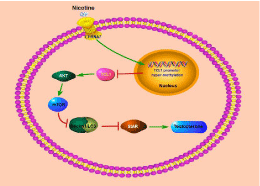Letter to the Editor
Many previous reports have shown that nicotine exposure have hazardous effects on testosterone [1,2], which is produced within the testis by Leydig cells [3]. Recently, a research claimed that apoptosis has been detected in Leydig cells after nicotine exposure [4]. However, our past and present data has shown that apoptosis was not detected in Leydig cells [5,6].
After construction of the nicotine-treated animal model, we detected that the concentration of testosterone in the sera of nicotine-treated mice has statistically decreased. Likewise, increase in autophagy of testis following nicotine treatment has also been detected by monodansylcadaverine (MDC) staining and immunofluorescence. Additionally, the analysis of nextgeneration sequencing data indicated that autophagy-related genes were increased after nicotine treatment. Our research also found that methylation of the promoter region of TCL1 (T-cell leukemia/ lymphoma protein1) [7] was increased in the nicotine-treated group compared to the control group. Eventually, we found that nicotine can decrease the activity of CHRNA7 [8] and reduce the expression of TCL1 by hypermethylation of the TCL1 promoter. Next, the AktmTOR pathway [9] was suppressed, and autophagy was activated, altering the structure of Leydig cells, including its mitochondria. As a result, the expression of StAR (steroidogenic acute regulatory protein), a key enzyme in testosterone synthesis, was downregulated (Figure 1). This resulted in the decrease of the concentration of serum testosterone [10].

Figure 1: Mechanism for nicotine–regulated autophagy.
Conclusion
In conclusion, our present study provides a novel molecular mechanism, illustrated by the TCL1-mTOR-autophagy pathway, by which nicotine can decrease serum testosterone through autophagy of Leydig cells.
Nicotine interacts with the CHRNA7 transmembrane transporter protein and methylates the TCL1 promoter region in the cell following a phosphorylation cascade. This methylation reduces TCL1 gene expression, thus decreasing the concentration of Akt and consequently mTOR. Decrease in concentration of mTOR encourages the accumulation of Beclin1 and LC3, promoting autophagy and downregulating StAR, which reduces testosterone production.
References
- Sarasin A, Schlumpf M, Muller M, Fleischmann I, Lauber ME, Lichtensteiger W. Adrenal-mediated rather than direct effects of nicotine as a basis of altered sex steroid synthesis in fetal and neonatal rat. Reprod Toxicol. 2003; 17: 153-162.
- Kavitharaj NK, Vijayammal PL. Nicotine administration induced changes in the gonadal functions in male rats. Pharmacology. 1999; 58: 2-7.
- Bjelic MM, Stojkov NJ, Baburski AZ, Sokanovic SJ, Mihajlovic AI, Janjic MM, et al. Molecular adaptations of testosterone-producing Leydig cells during systemic in vivo blockade of the androgen receptor. Mol Cell Endocrinol. 2014; 396: 10-25.
- Guo X, Wang H, Wu X, Chen X, Chen Y, Guo J, et al. Nicotine affects rat Leydig cell function in vivo and vitro via down-regulating some key steroidogenic enzyme expressions. Food Chem Toxicol. 2017; 110: 13-24.
- Nie D, Zhang D, Dai J, Zhang M, Zhao X, Xu W, et al. Nicotine Induced Murine Spermatozoa Apoptosis via Up-Regulation of Deubiquitinated RIP1 by Trim27 Promoter Hypomethylation. Biol Reprod. 2016; 94: 31.
- Gu Y, Xu W, Nie D, Zhang D, Dai J, Zhao X, et al. Nicotine induces Nme2- mediated apoptosis in mouse testes. Biochem Biophys Res Commun. 2016; 472: 573-579.
- Bresin A, D’Abundo L, Narducci MG, Fiorenza MT, Croce CM, Negrini M, et al. TCL1 transgenic mouse model as a tool for the study of therapeutic targets and microenvironment in human B-cell chronic lymphocytic leukemia. Cell Death Dis. 2016; 7: e2071.
- Dai J, Xu W, Zhao X, Zhang M, Zhang D, Nie D, et al. Protein profile screening: reduced expression of Sord in the mouse epididymis induced by nicotine inhibits tyrosine phosphorylation level in capacitated spermatozoa. Reproduction. 2016; 151: 227-237.
- Schrader A, Popal W, Lilienthal N, Crispatzu G, Mayer P, Jones D, et al. AKT-pathway inhibition in chronic lymphocytic leukemia reveals response relationships defined by TCL1. Curr Cancer Drug Targets. 2014; 14: 700-712.
- Zhao X, Xu W, Wu J, Zhang D, Abou-Shakra A, Di L, et al. Nicotine induced autophagy of Leydig cells rather than apoptosis is the major reason of the decrease of serum testosterone. Int J Biochem Cell Biol. 2018; 100: 30-41.
